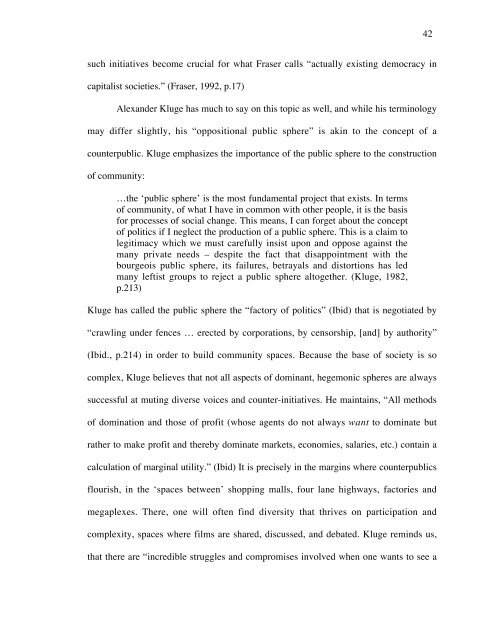The Spaces Between Grassroots Documentary ... - Ezra Winton
The Spaces Between Grassroots Documentary ... - Ezra Winton
The Spaces Between Grassroots Documentary ... - Ezra Winton
Create successful ePaper yourself
Turn your PDF publications into a flip-book with our unique Google optimized e-Paper software.
such initiatives become crucial for what Fraser calls “actually existing democracy in<br />
capitalist societies.” (Fraser, 1992, p.17)<br />
Alexander Kluge has much to say on this topic as well, and while his terminology<br />
may differ slightly, his “oppositional public sphere” is akin to the concept of a<br />
counterpublic. Kluge emphasizes the importance of the public sphere to the construction<br />
of community:<br />
…the ‘public sphere’ is the most fundamental project that exists. In terms<br />
of community, of what I have in common with other people, it is the basis<br />
for processes of social change. This means, I can forget about the concept<br />
of politics if I neglect the production of a public sphere. This is a claim to<br />
legitimacy which we must carefully insist upon and oppose against the<br />
many private needs – despite the fact that disappointment with the<br />
bourgeois public sphere, its failures, betrayals and distortions has led<br />
many leftist groups to reject a public sphere altogether. (Kluge, 1982,<br />
p.213)<br />
Kluge has called the public sphere the “factory of politics” (Ibid) that is negotiated by<br />
“crawling under fences … erected by corporations, by censorship, [and] by authority”<br />
(Ibid., p.214) in order to build community spaces. Because the base of society is so<br />
complex, Kluge believes that not all aspects of dominant, hegemonic spheres are always<br />
successful at muting diverse voices and counter-initiatives. He maintains, “All methods<br />
of domination and those of profit (whose agents do not always want to dominate but<br />
rather to make profit and thereby dominate markets, economies, salaries, etc.) contain a<br />
calculation of marginal utility.” (Ibid) It is precisely in the margins where counterpublics<br />
flourish, in the ‘spaces between’ shopping malls, four lane highways, factories and<br />
megaplexes. <strong>The</strong>re, one will often find diversity that thrives on participation and<br />
complexity, spaces where films are shared, discussed, and debated. Kluge reminds us,<br />
that there are “incredible struggles and compromises involved when one wants to see a<br />
42


